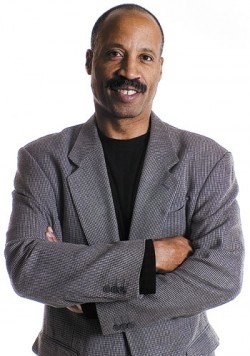Cuyahoga County Commissioner Peter Lawson Jones, knee-deep in a contentious re-election bid last fall, respectfully eschewed a shot at the Show when Congresswoman Stephanie Tubbs Jones died unexpectedly in August, saying he had unfinished business here at home. The chair went to Warrensville Heights Mayor Marcia Fudge.
But a few months into his new term, Jones told Scene on Monday that he's toying with the idea of going after the U.S. Senate seat that George Voinovich will vacate in 2010.
"I'm considering it, sure," he says. "I don't have an exploratory committee or anything, and it's not something I'll decide on officially until late spring or early summer. I just got out of a long race."
With the lead in Karamu House's current production, A House With No Walls, Jones is having a hard time planning his career too far in advance, but he's seen the field of Democratic candidates - Tim Ryan, Zack Space, Betty Sutton, Lee Fisher, Jennifer Brunner - being compiled by media observers and wouldn't mind seeing some, well, color added to the list. He isn't alone. On Sunday, former mayoral contender and former Cleveland Councilman Bill Patmon suggested that Jones, as well as Columbus Mayor Michael Coleman (who has said he won't run), rear their heads for a strike. One down, one to go. - Dan Harkins
HANG UP AND DRIVE
OMG, Zach Reed wants to ban texting and driving. UGTBFK, right? And BTW, he says cell phoning and driving is next.
But the Ward 3 councilman is serious. On Monday he introduced a resolution that would impose fines if a police officer witnesses a driver texting at the wheel - $100 for the first offense, $250/second, up to $500/third. He says he came up with the idea after spending the holidays in San Francisco with family and seeing that their ban on all cell phone use at the wheel was soon to start. Then he saw reps from the National Safety Council urging Congress to ban cell phones, using a Harvard Center of Risk Analysis study to show the stakes: an estimated 636,000 crashes, 330,000 injuries and 2,600 deaths each year due to cell phone use.
Texting is first, he says, then an outright ban. "No longer can the city of Cleveland or the state sit idly on the side when we know this problem exists," says Reed, a twice-convicted drunk driver - something the Harvard study says is much more dangerous. - Harkins
WE LIKE BIKES
You might call it "Opportunity Corridor West." On Friday, January 23, the Cleveland City Planning Commission unanimously expressed support for a proposal to remake Train Avenue into a parkway, with a bike trail connecting the Detroit Shoreway neighborhood and the lakefront with the Cuyahoga Valley National Park's Towpath Trail.
The neglected 2.5-mile route runs near train tracks decorated with colorful graffiti and has only a few businesses and little traffic. The businesses present at the planning commission meeting were supportive of the idea. When complete, the route would be a significant east-west corridor and a recreation and transportation asset in the oft-neglected neighborhoods of Clark-Metro and the Stockyards.
In addition to repaving and creating a bike trail, the plan would include landscaping with hundreds of trees, plus rain beds, which would help the city meet the EPA order to address combined sewers that overflow in heavy rains - and would cost less than building gigantic overflow chambers underground.
The preliminary estimates indicate that the entire project would cost just $2.6 million, because nearly all the land required is already in the public right of way. The only land acquisition required would be for a trailhead. The planning commission's support gives the sponsoring agencies - the CDCs and the Ohio Canal Corridor - the go-ahead to raise money for design and construction. George Cantor, Cleveland's planner for the near-west side, says potential money sources include the Clean Ohio Fund, President Obama's economic stimulus plan, the Northeast Ohio Areawide Coordinating Agency and the federal transportation bill. He says the project is doable in "three to five years." - Michael Gill HE WALKS THE LINE Former St. Ignatius Wildcat, Ohio State Buckeye and Cleveland Brown LeCharles Bentley may be done with his playing days, but that doesn't mean he's done with football. This weekend, Bentley celebrates the grand opening of the LeCharles Bentley O-Line Academy in Avon with an all-weekend open house.
Before camps get under way, and high school and college linemen get tutored by the former Pro-Bowler, get a peek at this state-of-the-art facility and the only such offensive-line academy in the nation. Coaches and players present can even get in on drawings for $30,000 worth of strength equipment for their schools. Everyone attending is asked to bring at least one canned food item for the Cleveland Food Bank.
Join Bentley and his group of instructors from 4-9 p.m. Friday, January 30; 10 a.m.-6 p.m. Saturday, January 31; and 1-5 p.m. Sunday, February 1. Visit o-lineacademy.com for more info, and stop on out this weekend to support a local boy doing good locally. - Vince Grzegorek
MEDIA MASSACRE OF THE WEEK
Under the cover of inauguration mania, media giant Clear Channel - the newly private mega-corporation that owns 1,200 radio stations nationwide, countless billboards and a nice lot in the third circle of Hades - let go of nearly 2,000 employees on January 20. About 40 of them worked at the 10 stations Clear Channel owns in Northeast Ohio.
The bulk of them were behind-the-scenes support staff and sales personnel. Most on-air talent was spared, but WGAR morning co-host Michelle Maloney and WTAM reporter Greg Saber got the axe. At this point in radio's war of attrition against itself, there's not much on-air talent left to cut. The infamous Telecommunications Act of 1996 allowed companies to own as many as eight stations in one market and eliminated the cap on the total number of stations they could own. So the corporate chains have increasingly relied on homogenized stations that are essentially the same nationwide, as opposed to local stations with specialized content and unique identities.
"The problem is radio is in the content business," explains media consultant John Gorman, who was WMMS' program director in the '70s and '80s, back when radio meant something. "And when you eliminate content, you're eliminating what you can sell. Why would you reduce content and sales people? It goes against business."
The local Clear Channel office directed inquires to the national office, which is a nice way of telling a reporter, "You can suck it - we don't have to say shit." Corporate responded with a generic "internal e-mail" from CC CEO Mark Mays that said, basically, times are tough but the future is bright - especially if you like radio with painfully small playlists, minimal personality and no local identity. - D.X. Ferris
BOTTOM'S UP COMES OUT
Bottom's Up (1572 W. 117th St.) has reopened as a gay bar. The Lakewood club is now being managed - but not exactly masterminded - by former Warrant guitarist Billy Morris and View From Everest guitarist Jimmy Maler, who own the nearby Hi-Fi Concert Club.
Maler and Morris have put the details of Bottoms Up's nightlife in the hands of former employees from the Grid, a downtown gay bar that recently closed.
"I think it's a great setup," says bartender Joe Humphries, who worked at the Grid for six years. "[Maler and Morris] know how to own and operate a club, and I know how to operate a gay club."
Bottom's Up was run as a hip-hop club in recent months. Maler and Morris cleaned up the building and installed new sound and light systems on the lower level, which will be open weekends, offering a nightclub atmosphere with a booming sound system and high-backed, velvet-covered seating. With pool tables and TVs, the upper level will be open during the week as a bar. "It's a place where anybody can come in and have a drink," says Humphries. "We're in the position to do something different [with] the music we play. It's music that isn't your typical gay club music … [Recently] I invited [DJ] Denny P. He plays a little bit of everything. You heard more rock remixes, '80s and indie-rock. We may have some live acts."
Morris concedes that the Hi-Fi has never been a model of efficiency, and its management team is spread thin, between booking bands and beer orders. "Admittedly, we don't know how to [present] and promote gay events," says Morris. "So we're giving the staff the chance to bring their own events in nightly. We're in the background, making sure the lights stay on and there's product to sell - quality control. The staff is putting their stamp on it."
Morris says Bottom's Up is operating independently of the Jigsaw Entertainment Group, which has had connections to rock clubs the Hi-Fi, Peabody's and the Agora. - Ferris














